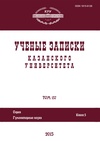Политика КНР по интеграции СиньцзянУйгурского автономного района: 1949–2018 годы
The Policy of the People’s Republic of China on Integration of the Xinjiang Uygur Autonomous Region: 1949–2018
Author(s): V. A. Epstein, D.A. BochkovSubject(s): Political history, Recent History (1900 till today), Government/Political systems
Published by: Казанский (Приволжский) федеральный университет
Keywords: People’s Republic of China; Xinjiang Uygur Autonomous Region; Silk Road Economic Belt; integration stages; Uygurs; Han Chinese people; terrorism; separatism; transport corridor;
Summary/Abstract: The paper examines the issue of regional specificity of the Xinjiang Uygur Autonomous Region and analyzes the main stages of its integration into the People’s Republic of China. The Chinese government has become aware of the importance of economic prospects of Xinjiang in terms of its foreign economic ambitions since the 1990s. In this regard, China initiated the program “the Great Development of the West” in 1999–2000. The program was adopted during the 4th Plenum of the 15th Central Committee of the Communist Party of China. It is planned until 2050 and devoted to the development of the country’s western territories, including Xinjiang. However, the implementation of the program encounters the rejection of many of its provisions by the local traditional population, since major infrastructure projects are changing the cultural, economic, and socio-demographic landscape of the region. Beijing has intensified its interest in the region as a result of the launch of “One Belt One Road” initiative which was announced by China’s President Xi Jinping in September 2013. The explanation to this rests within the fact that nearly all main land routes of the Chinese transport project are planned to transcend the region. Beijing believes that economic development and modernization will lead to curbing of the Uigurs’ and other indigenous people’s aspirations towards political autonomy. In this respect, there is an increasing need for ensuring the region security and accelerating implementation of a complex of cultural, economic, and military-police activities to minimize terrorist threats and open display of discontent among Muslim ethnic groups of the region.
Journal: Ученые записки Казанского университета. Серия Гуманитарные науки
- Issue Year: 160/2018
- Issue No: 6
- Page Range: 1442-1454
- Page Count: 13
- Language: Russian

